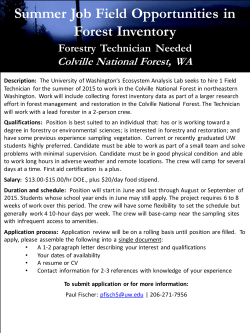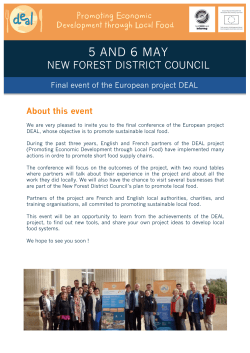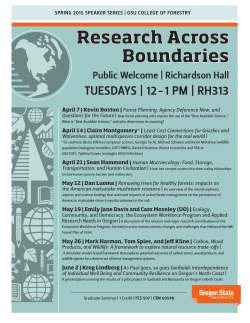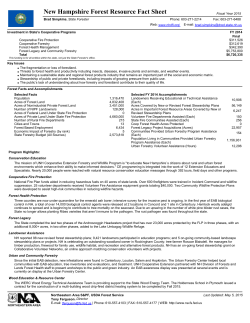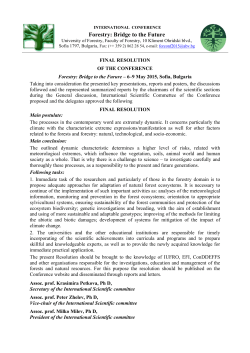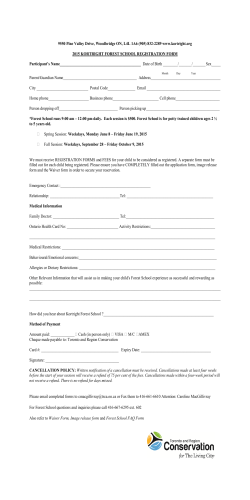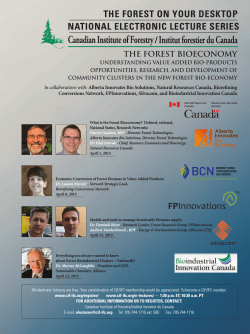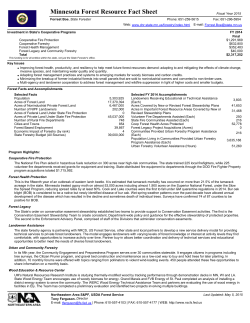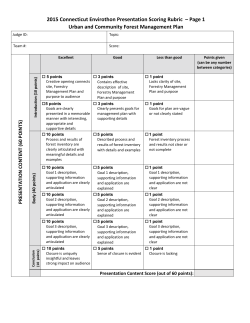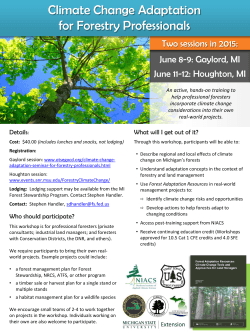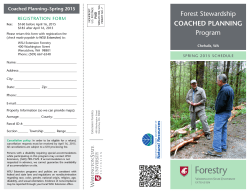
Brief - USDA Forest Service
Massachusetts Forest Resource Fact Sheet Peter Church, Director of Forest Stewardship Fiscal Year 2015 Phone: 617-626-1461 Web: www.mass.gov/eea/state-parks-beaches/sustainable-forest-management/ Fax: 617-626-1449 E-mail: [email protected] Investment in State's Cooperative Programs FY 2014 Final $824,016 $1,283,140 $280,855 $2,242,457 $4,630,468 Cooperative Fire Protection Cooperative Forestry Forest Health Management Forest Legacy and Community Forestry Total This funding is for all entities within the state, not just the State Forester's office. Key Issues Controlling Asian longhorned beetle infestation. Connecting people to forest sustainability. Changing land use, including fragmentation. Education and interdisciplinary approach to forest health and invasive species. Providing private landowner and urban community forestry services. Forest Facts and Accomplishments Selected Facts Population Acres of Forest Land Acres of Nonindustrial Private Forest Land Number of NIPF Landowners Acres of Federal Land Under State Fire Protection Acres of Private Land Under State Fire Protection Number of Rural Fire Departments Cities and Towns Forest Based Employment Economic Impact of Forestry (by rank) State Forestry Budget (All Sources) 6,547,629 3,024,092 2,179,000 293,000 0 3,200,000 220 53 20,647 6 3,750,000 Selected FY 2014 Accomplishments Landowners Receiving Educational or Technical Assistance (Each) Acres Covered by New or Revised Forest Stewardship Plans Acres in Important Forest Resource Areas Covered by New or Revised Stewardship Plans Volunteer Fire Departments Assisted (Each) State Fire Communities Assisted (Each) Coop Forest Health Acres Protected Forest Legacy Project Acquisitions (Acres) Communities Provided Urban Forestry Program Assistance (Each) Population Living in Communities Provided Urban Forestry Program Assistance (Each) Urban Forestry Volunteer Assistance (Hours) 15,510 23,417 12,385 43 637 500 0 173 4,566,532 22,717 Program Highlights: Conservation Education The Massachusetts Envirothon is in its 27th year. Five-student teams represent their school or organization in a competition testing knowledge on aquatics, forestry, soils, wildlife, a current environmental issue and ecosystem concepts. Cooperative Fire Protection Core funds aided the purchase of equipment and updates for the state’s communications system. Staff delivered 55 prevention programs and trained 330 firefighters. 40 communities received wildland fire equipment and training through the VFA Program. Federal Excess Personal Property program acquisitions totaled $1,295,692; DOD Fire Fighter Property program acquisitions totaled $130,427. Hazardous fuels - more than 830 acres near 22 high-risk communities. Forest Health Protection Infestations of the cynipid gall continue, with some areas showing heavy defoliation and possible future tree. Emerald ash borer monitoring and management and efforts to eradicate the Asian longhorned beetle in Worcester Co. continue. Winter moth defoliated 33,792 acres. Release of winter moth parasite Cyzenis albicans continued, with recovery at 17 sites. Forest Legacy The Heritage Corridor Forest Legacy Area Amendment received final approval from the U.S. Forest Service on October 23, 2013, with the help of The MassConn Sustainable Partnership and a number of their associated partners. Landowner Assistance MA reported 512 new/revised stewardship plans for 48,537 acres; and 23 programs for 1,680 landowners. MA has two on-going competitive forest stewardship grants (Redesign/LSR): Creating a Buy Local Model for Working Forests, and Small Forest Landowner Outreach Initiative for the Quabbin to Cardigan Priority Landscape. MA started the Foresters for the Birds program based on the highly successful Vermont model. MA has integrated the federal Forest Stewardship Program and the Working Forest Initiative, a MA state program, adding state support and funding to federal funding. Urban and Community Forestry The MA UCF Program worked on a pilot planting program, Greening the Gateway Cities. The program plants trees in urban areas with low canopy cover to reduce energy use. Three Gateway Cities were Chelsea, Holyoke, and Fall River (Forest Action Plan priority areas). Targeted planting areas had a goal to increase canopy cover by 10%. 476 trees were planted on both public and private property. The project scale was increased for the fall planting season. Wood Education & Resource Center The WERC Wood Energy Technical Assistance Team provided technical assistance to 10 projects to offset about 164,000 gallons of heating oil and use about 1,800 tons of woody biomass annually. One project was Narragansett HS in Baldwinsville, which received a $250k FS Woody Biomass Utilization Grant. Saint Benedict’s monastery is using funds from a state grant program. Harvard Forest completed a wood-fired heating system serving 7 campus buildings. For more information on this project visit http://harvardforest.fas.harvard.edu/biomass Northeastern Area S&PF, USDA Forest Service Last Updated: April 10, 2015 Tony Ferguson, Director E-mail: [email protected] | Phone: 610-557-4103 | FAX: 610-557-4177 | WEB: http://www.na.fs.fed.us
© Copyright 2026
